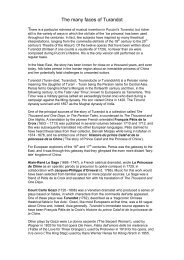NEF-Southampton-Positive-Money-ICB-Submission
NEF-Southampton-Positive-Money-ICB-Submission
NEF-Southampton-Positive-Money-ICB-Submission
You also want an ePaper? Increase the reach of your titles
YUMPU automatically turns print PDFs into web optimized ePapers that Google loves.
Part III: Addressing Common MisconcepPons about Full-‐Reserve Banking<br />
1. ‘Full-‐reserve banking would lead to a shortage of credit’<br />
The first issue to recognise is that the current level of demand for credit is more accurately described as a<br />
dependence on debt. This dependence arises for two reasons:<br />
1.The only method by which the public, collecGvely, can get access to bank deposits (‘money’) is by<br />
taking on loans from a bank. Therefore, if the economy needs more money, this new money must be<br />
borrowed from a bank. This means that the lack of an alternaGve method of injecGng money into the<br />
economy ensures that the demand for credit is arGficially inflated.<br />
2.The fact that every bank loan issued creates brand new, addiGonal purchasing power is a major<br />
contribuGng factor in inflaGon. The 150% (£1.2 trillion) increase in the money supply from 2000 to<br />
2009 was undoubtedly significant in the 197% increase in house prices 15 , given that the bulk of new<br />
money created as a result of lending goes directly into the housing market. This implies that the<br />
demand for credit now is arGficially inflated by the ability of bank lending to inflate house prices and<br />
require members of the public to borrow more in order to buy a house.<br />
As a result, we would say that the fracGonal reserve banking system arGficially inflates the need for credit,<br />
and that the demand for credit will always be higher under a fracGonal reserve banking system than under a<br />
full-‐reserve banking system.<br />
In other words, there will be less need for credit in a full-‐reserve banking system.<br />
In addiGon, the introducGon of a new source of ‘debt-‐free’ money via the Monetary Policy CommiOee and<br />
government spending (or tax reducGons) will allow the public to reduce their overall level of debt. With lower<br />
debt, households will have higher disposable income and therefore less need to borrow.<br />
The implicaGon is that, following a period of transiGon, the need for credit will be much lower under full-‐<br />
reserve banking than under a fracGonal reserve banking system.<br />
The transiGon between our current, high level of dependency on credit, and a lower level of credit under full-‐<br />
reserve banking, can be managed so as to avoid any form of short-‐term credit crunch. There are various<br />
methods of easing this transiGon, such as the Bank of England and MPC creaGng addiGonal new money that<br />
can be lent-‐on by the banks, in order to fill the temporary gap between the current demand for credit and the<br />
current level of real savings. As the benefits of full-‐reserve banking start to play out in the economy, this<br />
temporary provision of credit may be gradually phased out.<br />
2. ‘[Full-‐reserve banks] Pe up bank deposits, rather than allowing them to be made available to<br />
fund producPve investment through financial intermediaPon.’<br />
This statement, adapted from the Commission’s Issues paper, has a number of problems.<br />
15 See M4 figures from the Bank of England’s interacAve staAsAcal database, and NaAonwide’s House Price Index.<br />
25



